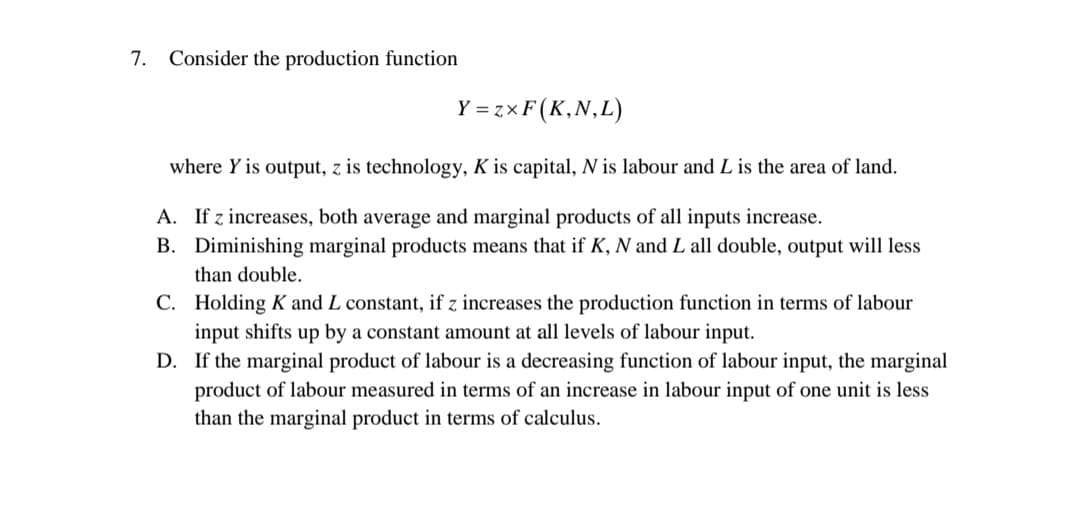7. Consider the production function Y = zx F(K,N,L) where Y is output, z is technology, K is capital, N is labour and L is the area of land. A. If z increases, both average and marginal products of all inputs increase. B. Diminishing marginal products means that if K, N and L all double, output will less than double. C. Holding K and L constant, if z increases the production function in terms of labour input shifts up by a constant amount at all levels of labour input. D. If the marginal product of labour is a decreasing function of labour input, the marginal product of labour measured in terms of an increase in labour input of one unit is less than the marginal product in terms of calculus.
7. Consider the production function Y = zx F(K,N,L) where Y is output, z is technology, K is capital, N is labour and L is the area of land. A. If z increases, both average and marginal products of all inputs increase. B. Diminishing marginal products means that if K, N and L all double, output will less than double. C. Holding K and L constant, if z increases the production function in terms of labour input shifts up by a constant amount at all levels of labour input. D. If the marginal product of labour is a decreasing function of labour input, the marginal product of labour measured in terms of an increase in labour input of one unit is less than the marginal product in terms of calculus.
Managerial Economics: Applications, Strategies and Tactics (MindTap Course List)
14th Edition
ISBN:9781305506381
Author:James R. McGuigan, R. Charles Moyer, Frederick H.deB. Harris
Publisher:James R. McGuigan, R. Charles Moyer, Frederick H.deB. Harris
Chapter7: Production Economics
Section: Chapter Questions
Problem 7E
Related questions
Question

Transcribed Image Text:7. Consider the production function
Y = zxF(K,N,L)
where Y is output, z is technology, K is capital, N is labour and L is the area of land.
A. If z increases, both average and marginal products of all inputs increase.
B. Diminishing marginal products means that if K, N and L all double, output will less
than double.
C. Holding K and L constant, if z increases the production function in terms of labour
input shifts up by a constant amount at all levels of labour input.
D. If the marginal product of labour is a decreasing function of labour input, the marginal
product of labour measured in terms of an increase in labour input of one unit is less
than the marginal product in terms of calculus.
Expert Solution
This question has been solved!
Explore an expertly crafted, step-by-step solution for a thorough understanding of key concepts.
Step by step
Solved in 3 steps

Knowledge Booster
Learn more about
Need a deep-dive on the concept behind this application? Look no further. Learn more about this topic, economics and related others by exploring similar questions and additional content below.Recommended textbooks for you

Managerial Economics: Applications, Strategies an…
Economics
ISBN:
9781305506381
Author:
James R. McGuigan, R. Charles Moyer, Frederick H.deB. Harris
Publisher:
Cengage Learning

Microeconomics: Private and Public Choice (MindTa…
Economics
ISBN:
9781305506893
Author:
James D. Gwartney, Richard L. Stroup, Russell S. Sobel, David A. Macpherson
Publisher:
Cengage Learning

Economics: Private and Public Choice (MindTap Cou…
Economics
ISBN:
9781305506725
Author:
James D. Gwartney, Richard L. Stroup, Russell S. Sobel, David A. Macpherson
Publisher:
Cengage Learning

Managerial Economics: Applications, Strategies an…
Economics
ISBN:
9781305506381
Author:
James R. McGuigan, R. Charles Moyer, Frederick H.deB. Harris
Publisher:
Cengage Learning

Microeconomics: Private and Public Choice (MindTa…
Economics
ISBN:
9781305506893
Author:
James D. Gwartney, Richard L. Stroup, Russell S. Sobel, David A. Macpherson
Publisher:
Cengage Learning

Economics: Private and Public Choice (MindTap Cou…
Economics
ISBN:
9781305506725
Author:
James D. Gwartney, Richard L. Stroup, Russell S. Sobel, David A. Macpherson
Publisher:
Cengage Learning



Principles of Economics (MindTap Course List)
Economics
ISBN:
9781305585126
Author:
N. Gregory Mankiw
Publisher:
Cengage Learning